Do you have trouble falling asleep or staying asleep at night? If so, caffeine could be keeping you awake even though you never consume it at night. That’s because caffeine has a longer-lasting effect than you may think.
Negative Health Effects of Insomnia
Caffeine disrupts deep (restorative) sleep and the ability to fall asleep, which cuts down on total sleep time. Insomnia has negative health effects, such as:
- Overeating and binge eating
- Weight gain
- Obesity
- Increased mortality — According to a study by the American Cancer Society (Mortality Associated with Sleep Duration and Insomnia), insufficient sleep can shorten your life. Causes of death associated with sleep duration include heart disease, stroke, and breast/colon cancer.
Why Caffeine Has a Lasting Effect (Half-Life Explained)
Caffeine has a half life of five to six hours. In other words, it takes five to six hours for the amount of caffeine in your body to be reduced to exactly one-half of its concentration.
Translation: the amount of caffeine remaining in your body after six hours is equal to the amount you excrete.
How It Breaks Down
The half-life of caffeine in a healthy adult is six hours. This does not take into consideration half-life variables (see below) that can influence how fast/slow a person metabolizes caffeine.
 Due to the half-life of caffeine, caffeine starts accumulating in your body when you consume it throughout the day.
Due to the half-life of caffeine, caffeine starts accumulating in your body when you consume it throughout the day.
This could be in the form of another drink, food, or even medication.
- For example, if you drink two cups of coffee every day at 8:00 AM, by Day 3 at 2:00 AM nearly 45 gm of caffeine could still be in your system.
 To compound the caffeinated effect, if you drink another cup of coffee at 2:00 PM as an afternoon pick-me-up, by Day 3 at 2:00 AM, nearly 90 gm of caffeine could still be in your system.
To compound the caffeinated effect, if you drink another cup of coffee at 2:00 PM as an afternoon pick-me-up, by Day 3 at 2:00 AM, nearly 90 gm of caffeine could still be in your system.
That’s nearly the amount of caffeine in a 16-oz Frappuccino® — a clue as to why you may not be able to sleep well.
Your Personal Buzz (Half-Life Variables)
The half-life of caffeine is not a fixed number and can vary based on the individual. Variables include your:
- Weight
- Body mass
- Sex
- Age: Caffeine half-life generally increases with age, so it takes longer to leave your system. That’s why caffeine may affect your sleep more than when you were younger.
- Race
- Genetic factors: Some people may lack the gene — or the gene may be defective — that influences caffeine metabolism.
- Liver function: Caffeine is processed in the liver. The half-life of caffeine can be up to 96 hours if you have liver disease and even as high as 168 hours in patients with alcoholic hepatic disease.
- Pregnancy: Caffeine half-life can increase up to 14 hours in later stages of pregnancy.
- Smoking: Smokers clear caffeine from the body faster than non-smokers, which may explain why smokers tend to consume more coffee.
- Concurrent medication
Caffeine Content in Common Foods
- Coffee, Short (8 oz), 100-175 mg
- Double espresso shot (2 oz), 60-100 mg
- Green tea (8 oz), 20 to 30 mg
- Extra-strength pain reliever, 130 mg per dose (two tablets)

Chocolate (1.5 oz):
- 11% cacao (milk), 9 mg
- 43% cacao (semi-sweet), 33 mg
- 50% cacao, 43 mg
- 60% cacao (bittersweet), 51 mg
- 70% cacao, 60 mg
- 80% cacao, 68 mg
- 90% cacao, 75 to 80 mg
- 100% cacao, 85 mg
Other Caffeinated Foods
- Hot chocolate (8 to 16 oz), 10 to 25 mg
- Caffeinated soft drinks (12 oz), 5 to 75 mg
- Decaffeinated coffee, (8 oz), 5 mg
- Energy drinks (2 to 16 oz), 5 to 245 mg
Caffeine Content in Common Over-the-Counter Drugs
- Alka-Seltzer Wake-up Call®, 65 mg
- Anacin® maximum strength, 32 mg
- Appetite-control pills, 100 to 200 mg
- Dexatrim® appetite suppressant, 200 mg
- Diurex® water pills, 50 mg
- Dristan® capsules, 16 mg
- Excedrin® (2 tablets), 130 mg
- Midol® menstrual maximum strength caplets, 60 mg
- NoDoz®, 200 mg
- NoDoz®, maximum strength, 200 mg
- Vanquish® caplets, 33 mg
- Vivarin®, 200 mg
Caffeine Content in Common Prescription Drugs
- Cafergot® suppositories (migraine headache treatment), 100 mg
- Fiorinal® capsules/tablets (headache pain reliever), 40 mg
- Norgesic® (muscle relaxant), 30 mg
- Triaminacin® (acetaminophen) with codeine tablets, 30 mg
Should I Limit My Caffeine Intake?
For optimum health, limit your caffeine intake to:
- 400 mg/day or less (as recommended by the FDA)
- 250 mg/day or less if you’re over 65 years old (1.5 cups coffee = 150 to 260 mg)
- 0 mg/day if you’re anxious, agitated and/or depressed
Can Heart Patients Consume Caffeine?
- According to the American Heart Association, the results linking high caffeine intake with heart disease are conflicting possibly due to the way the studies were performed and to a varying intake of dietary fats and cholesterol.
- Per a study of nearly 46,000 American men ages 40 to 75 years old and no history of cardiovascular disease, there was NO conclusive evidence that linked caffeine consumption with:
- Increased risk of heart attack
- Need for coronary-artery bypass grafting or angioplasty
- Risk of stroke
![]() Karen’s Fit Tip: If you’re having trouble sleeping, take note of what you’re eating, drinking, and what medications you’re taking and see if your caffeine intake is to blame, then gradually cut back on your intake. See How Much Sleep Do You Need?
Karen’s Fit Tip: If you’re having trouble sleeping, take note of what you’re eating, drinking, and what medications you’re taking and see if your caffeine intake is to blame, then gradually cut back on your intake. See How Much Sleep Do You Need?





